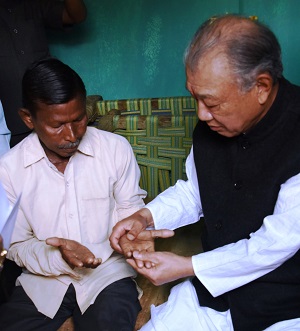Reviewing leprosy elimination and welfare efforts in state
Mr Yohei Sasakawa, WHO Goodwill Ambassador for Leprosy Elimination and Chairman of The Nippon Foundation visited Chhattisgarh from 1-3 February 2017 to discuss ongoing efforts toward disease control and welfare program for people affected by leprosy and their family members.
The visit had a three-point agenda: promote work towards leprosy elimination, address discrimination arising out of the status of ‘people affected by leprosy’ and visit leprosy colonies to interact with the residents.
"The visit of WHO Goodwill Ambassador, Mr Sasakawa and the joint launch of Global Appeal in India by him and the Inter-Parliamentary Union has provided a reinvigorated focus on India’s fight against leprosy,” said Dr Henk Bekedam, WHO Representative to India.
“To successfully eliminate leprosy as a public health problem, it is important to put a stop to leprosy transmission, its associated disabilities, stigma and discrimination against persons affected by leprosy, and this is possible through early detection, robust surveillance, community outreach and awareness generation. One of the interim indicators of success is zero leprosy-related disabilities in children - the theme of this year’s World Leprosy Day,” he added.
During his visit, Mr Sasakawa met the State Health Minister, Minister of Social Welfare and other political leaders, and stakeholders associated with leprosy control activities at grassroots level in Chhattisgarh. Mr Sasakawa also discussed with the state officials about how to eliminate stigma and discrimination against people affected by the disease.
“On my visit to Chhattisgarh, I was able to learn about the innovative steps the state is taking to eliminate leprosy, including plans for a coordinating committee that will cut across different ministries and agencies and deal comprehensively with the various challenges that the disease poses,” highlighted Mr Sasakawa.
He further urged the media to report that leprosy is curable, the disease is not highly contagious and that there are no grounds for discriminating against people affected by leprosy.

Mr Sasakawa visited leprosy colonies in village Khatti in the Mahasamund block and village Memra in Pithora block. He interacted with colony residents and assured essential help required for their relief and rehabilitation.
Mr Sasakawa was accompanied by a 13-member delegation and the visit coordinated by the Association of Persons Affected by Leprosy (APAL).
